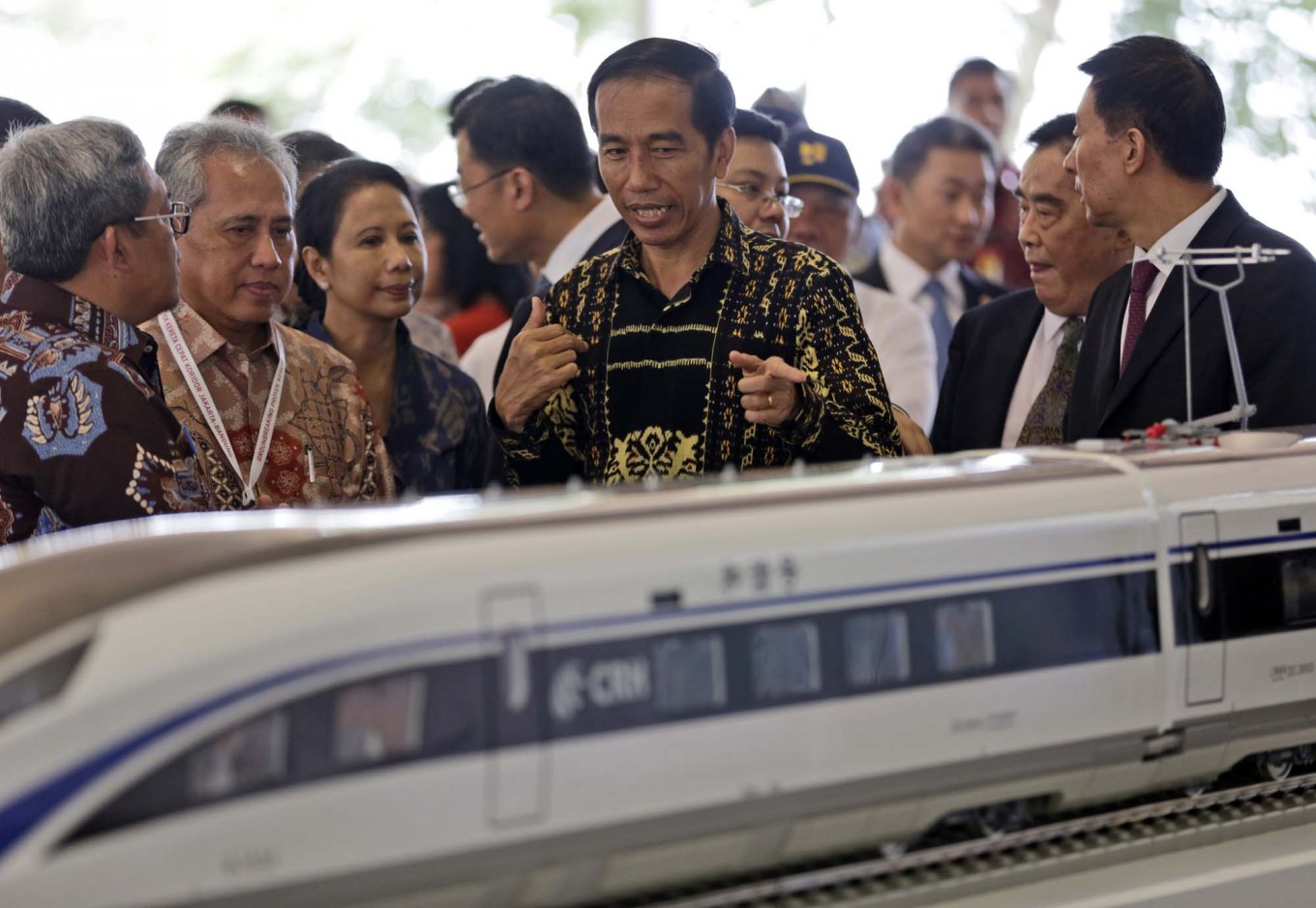Popular Reads
Top Results
Can't find what you're looking for?
View all search resultsPopular Reads
Top Results
Can't find what you're looking for?
View all search resultsIndonesia might see high-speed rail costs swell amid changes
Change text size
Gift Premium Articles
to Anyone
 Indonesian President Joko Widodo, center, gestures as he inspects a model of the high-speed train which will connect the capital city of Jakarta to the country's fourth largest city, Bandung, along with, from left to right, West Java Governor Ahmad Heryawan, Director of Indonesia China High Speed Train Hanggoro Budi Wiryawan, Indonesian Minister for State Enterprises Rini Soemarno, President of China Railway Corp. Sheng Guangzu and Chinese State Councilor Wang Yong, during the groundbreaking ceremony for the construction of its railway in Cikalong Wetan, West Java, Indonesia, Thursday, Jan. 21, 2016. (AP Photo/Dita Alangkara)
Indonesian President Joko Widodo, center, gestures as he inspects a model of the high-speed train which will connect the capital city of Jakarta to the country's fourth largest city, Bandung, along with, from left to right, West Java Governor Ahmad Heryawan, Director of Indonesia China High Speed Train Hanggoro Budi Wiryawan, Indonesian Minister for State Enterprises Rini Soemarno, President of China Railway Corp. Sheng Guangzu and Chinese State Councilor Wang Yong, during the groundbreaking ceremony for the construction of its railway in Cikalong Wetan, West Java, Indonesia, Thursday, Jan. 21, 2016. (AP Photo/Dita Alangkara)
T
he upcoming Jakarta-Bandung high-speed rail project is in danger of costing more than it should, with shifting designs of the project threatening to swell costs from the intial estimate of US$5.5 billion to $5.9 billion.
State-Owned Enterprises (SOE) Minister Rini Soemarno said several changes to certain parts of the tunnel could result in rising land prices, which would contribute to the swelling costs. The issue has been discussed with the largest foreign investor of the project, China Development Bank (CDB).
“We have discussed project figures with the China Development Bank and they don’t have a problem with a possible increase in costs. The internal rate of return is still good and feasible,” she said at an SOE event at The Ritz-Carlton Pacific Place Jakarta on Thursday.
The minister is looking for CDB funds to come through by a May deadline so that construction can resume.
On April 4, Indonesia-China consortium Kereta Cepat Indonesia China (KCIC) signed a US$4.7 billion engineering, procurement and construction (EPC) contract to build the railway with a consortium of seven companies called the High Speed Railway Contractor Consortium.
(Read also: Indonesia to recalculate high-speed railway investment)
The value was higher than the initial estimate of $4.3 billion, due to adjustments in the design details. The government awarded KCIC a fixed concession period of 50 years starting on May 31, 2019, which means the construction must be completed by then.
The railway has not seen significant development since the government issued the construction permit for the 142.3-kilometer track connecting Jakarta and Bandung, West Java, in July last year. The construction was initially slated to begin in late August.
In its latest research report entitled “Outlook for Indonesia’s Construction Sector,” BMI Research highlighted the country’s continued high-risk project environment, leading to its less-optimistic outlook for the construction sector.
Frequent delays, which increase the risk of cost overruns that make projects financially unfeasible, have continued to deter private investment and involvement in public-sector and public-private partnership projects, placing a lid on Indonesia’s infrastructure development potential.
“We previously said we expected improvements in the project environment to be gradual — specifically land-acquisition and bureaucratic approval procedures, and we maintain that view in light of persistent reports of project delays,” the unit of Fitch Group wrote.
A number of “priority projects” are at risk of delay or cancellation, while ongoing projects are likely to be completed past their planned deadlines, according to the firm.
“In particular, high-value projects like the Jakarta-Bandung High-Speed Railway, the Jakarta-Surabaya Railway and the Jakarta Mass Rapid Transit [MRT] have all been revised, suspended and restarted at various points, reflecting the country’s poor project environment,” BMI said in the report.
The high-speed railway is one of the national strategic projects included in Presidential Regulation No. 3/2016, which stipulates that the government and related agencies must aid in the issuance of permits. The railway will connect four cities between Jakarta and Bandung, namely Halim, Karawang, Tegalluar and Walini.
The project construction has been facing challenges regarding land procurement, which was previously cited by the Transportation Ministry as the main problem that needed to be solved after the issuance of the construction permit.
CDB initially reported that 100 percent of the land must be legally procured before the loan agreement signing. Thus, KCIC has until December 2017 to secure the 600 hectares needed for the project.
CDB also required the project to be included in the national spatial plan (RTRW), which according to Rini was one of the factors that hampered the land procurement. The much-awaited RTRW would be in the form of a government regulation (PP), which she said had been submitted to the Cabinet secretariat.









